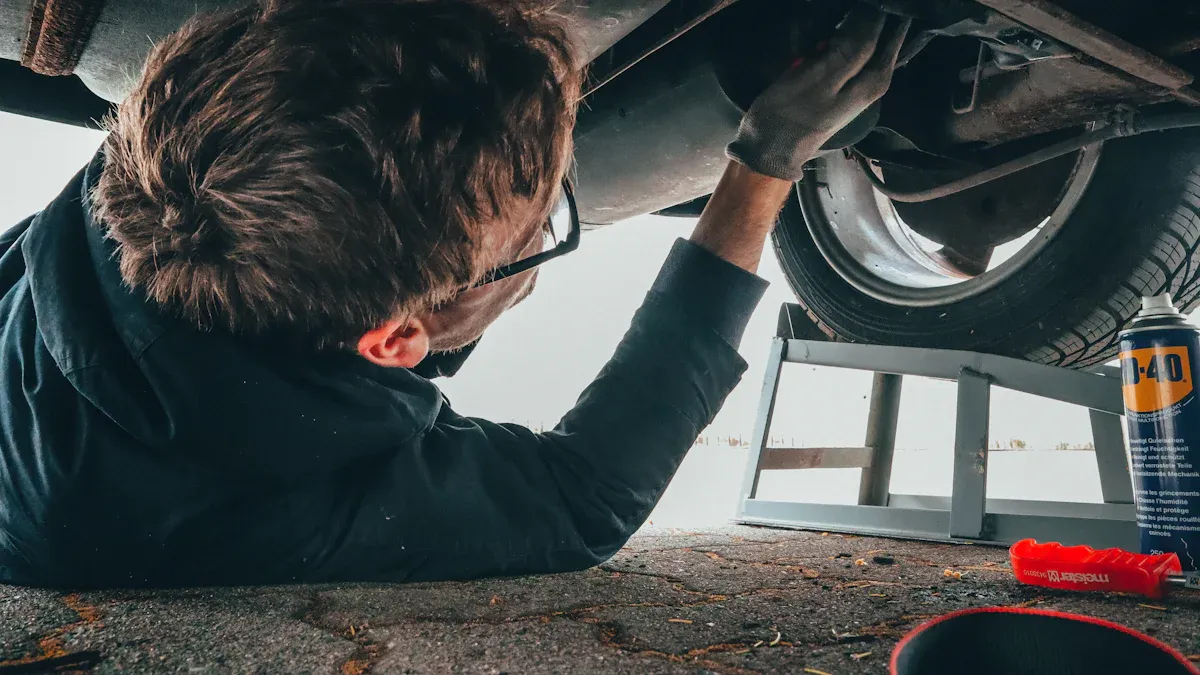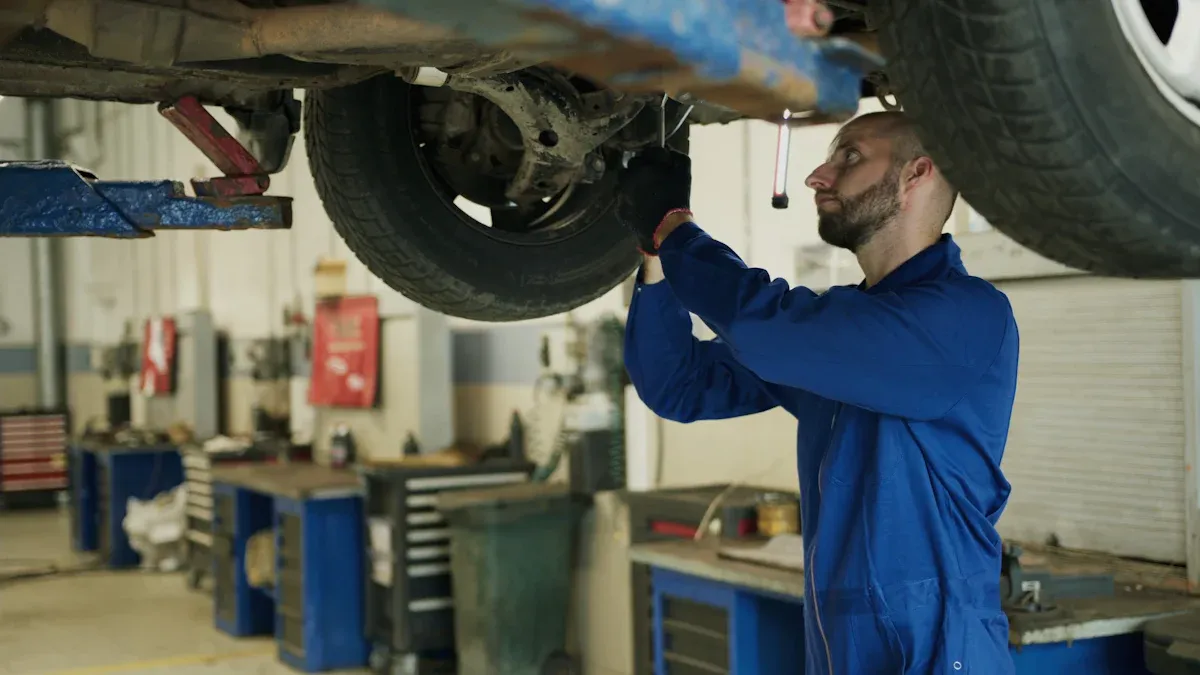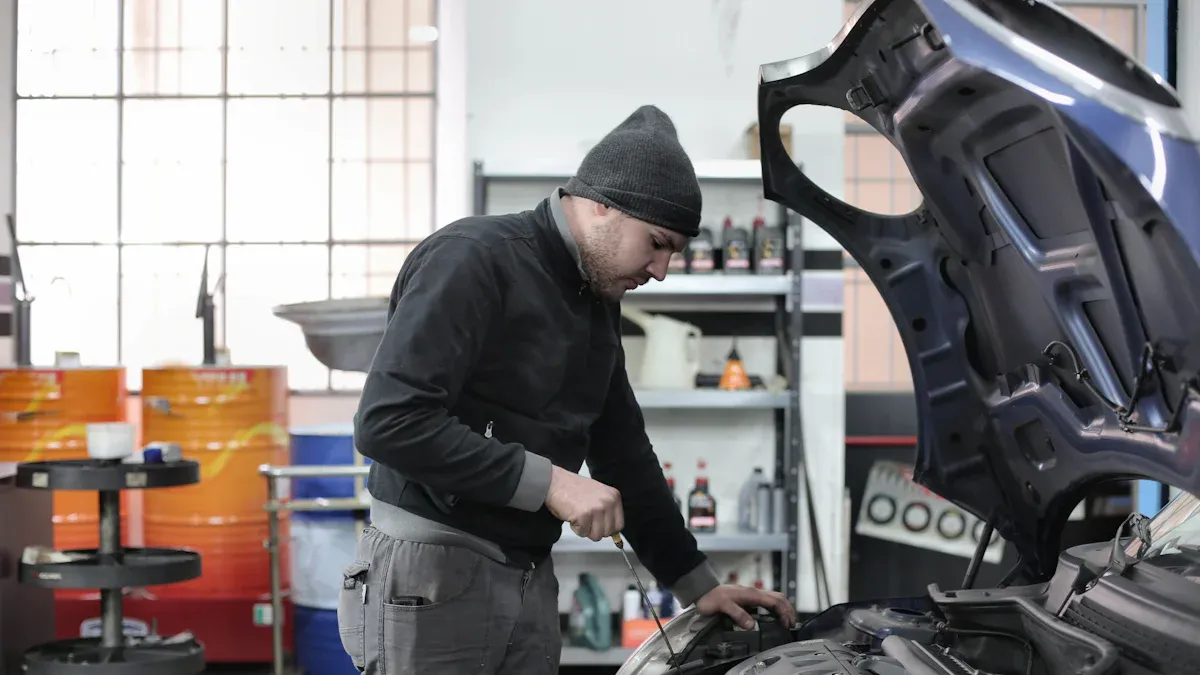
Driving with a bad clutch master cylinder puts you at risk. It makes shifting gears harder, which can lead to unsafe driving situations. If your clutch system isn’t working properly, you could lose control of your vehicle. Fixing the problem quickly keeps you safe and prevents costly damage to your car.
Key Takeaways
- Driving with a faulty clutch master cylinder is risky. It may cause you to lose control and create unsafe situations.
- Noticing problems like hard gear shifting or a soft clutch pedal can help fix issues early and avoid expensive repairs.
- Taking care of your clutch system, like checking fluid and fixing odd problems, keeps your car safe and working well.
What is a clutch master cylinder?

The clutch master cylinder is a small but essential part of your car’s hydraulic clutch system. If you’ve ever wondered how your car shifts gears so smoothly, this component plays a big role. Let’s break it down.
Role in the hydraulic clutch system
The clutch master cylinder acts as the starting point for your car’s hydraulic clutch system. When you press the clutch pedal, this cylinder converts the force from your foot into hydraulic pressure. This pressure travels through the system to engage or disengage the clutch. Without it, the entire process of shifting gears would fall apart.
Think of it as the messenger in the system. It takes your input (pressing the pedal) and sends the signal (hydraulic pressure) to the clutch. If the clutch master cylinder fails, this message doesn’t get delivered properly, and you’ll notice problems right away.
How it enables smooth gear shifting
You might not realize it, but every time you shift gears, the clutch master cylinder is hard at work. It ensures the clutch engages and disengages smoothly, allowing you to change gears without grinding or jerking. This makes driving more comfortable and keeps your car’s transmission in good shape.
When the clutch master cylinder is in good condition, you barely notice it. But when it starts to fail, shifting gears can become a real challenge. That’s why keeping this part in top shape is so important.
Can you drive with a bad clutch master cylinder?
Why driving with a failing clutch master cylinder is unsafe
Driving with a bad clutch master cylinder is like walking on thin ice. You never know when it might give out completely. When this part fails, it disrupts the hydraulic system that controls your clutch. This makes shifting gears unpredictable and unreliable. Imagine trying to merge onto a busy highway but being unable to shift into the right gear. That’s not just frustrating—it’s dangerous. Losing control over your gear shifts can put you and others at serious risk.
Risks of driving short distances with a bad clutch master cylinder
You might think, “It’s just a short trip. What could go wrong?” Unfortunately, even short drives can be risky. A failing clutch master cylinder can worsen quickly. You could find yourself stuck in traffic or unable to move your car at all. Plus, forcing the system to work when it’s already damaged can lead to more expensive repairs. It’s better to avoid driving altogether until the issue is fixed.
Potential long-term consequences of ignoring the issue
Ignoring a bad clutch master cylinder doesn’t just hurt your wallet—it can damage your car’s transmission. Over time, the added strain on the system can cause other components to wear out faster. This means higher repair bills and more time without your vehicle. Addressing the problem early saves you money and keeps your car running smoothly.
Symptoms of a failing clutch master cylinder

If your clutch master cylinder starts to fail, your car will give you some clear warning signs. Recognizing these symptoms early can save you from bigger problems down the road.
Difficulty shifting gears
One of the first things you might notice is trouble shifting gears. It might feel like the gearstick is stuck or requires extra force to move. This happens because the hydraulic pressure needed to engage the clutch isn’t working properly.
Spongy or unresponsive clutch pedal
Does your clutch pedal feel soft or spongy when you press it? Or maybe it doesn’t respond the way it used to? This is a common sign that the clutch master cylinder isn’t creating enough hydraulic pressure. It’s like pressing on a sponge instead of a solid pedal.
Clutch pedal sticking or failing to return
A healthy clutch pedal should spring back after you press it. If it sticks to the floor or takes its sweet time returning, that’s a red flag. This could mean the cylinder is leaking or has internal damage.
Leaking hydraulic fluid under the vehicle
Check under your car for any puddles of fluid. If you see a clear or slightly oily liquid near the clutch area, it could be hydraulic fluid leaking from the clutch master cylinder. This leak reduces the system’s ability to function.
Unusual noises when engaging the clutch
Strange sounds like squeaking or grinding when you press the clutch pedal can also point to a failing clutch master cylinder. These noises often mean the system is struggling to work properly.
Tip: If you notice any of these symptoms, don’t ignore them. Acting quickly can prevent further damage and keep your car safe to drive.
Risks of driving with a bad clutch master cylinder
Loss of control over gear shifting
When your clutch master cylinder starts failing, controlling your gear shifts becomes a gamble. You might find yourself stuck in the wrong gear at the worst possible moment. Imagine trying to accelerate onto a highway, but your car refuses to shift into the right gear. That’s not just frustrating—it’s dangerous. Losing control over gear shifting can make driving unpredictable and put you at risk of accidents. It’s like trying to steer a ship without a rudder. You need a functioning clutch system to stay in control.
Increased wear on the transmission and related components
A bad clutch master cylinder doesn’t just affect your ability to shift gears. It also puts extra strain on your car’s transmission and other parts of the clutch system. When the hydraulic pressure isn’t working as it should, the transmission has to work harder to compensate. Over time, this added stress can cause significant wear and tear. You might end up needing more than just a clutch master cylinder repair. Replacing worn-out transmission components can be a costly and time-consuming process.
Higher repair costs due to additional damage
Ignoring a failing clutch master cylinder can turn a small problem into a big expense. Driving with a damaged system can lead to cascading failures. For example, the added strain on your transmission could result in broken gears or a burned-out clutch. These repairs don’t come cheap. Addressing the issue early can save you from a hefty repair bill and keep your car running smoothly.
What to do if your clutch master cylinder is bad
Stop driving immediately to prevent further damage
If you suspect your clutch master cylinder is failing, stop driving right away. Continuing to drive can make the problem worse and lead to more expensive repairs. Plus, it’s not safe. A bad clutch master cylinder can leave you stranded or cause you to lose control of your car. Pull over to a safe spot and avoid driving until the issue is fixed.
Consult a professional mechanic for diagnosis
Once you’ve stopped driving, it’s time to call a professional mechanic. They have the tools and expertise to figure out what’s wrong. A mechanic will inspect the clutch system, check for leaks, and confirm if the clutch master cylinder is the problem. Don’t try to diagnose it yourself unless you’re experienced with car repairs. Getting a proper diagnosis ensures the right fix.
Repair or replace the clutch master cylinder
If the mechanic confirms the clutch master cylinder is bad, you’ll need to repair or replace it. In most cases, replacement is the best option. Repairs might not last long, especially if the cylinder is severely damaged. A new clutch master cylinder restores your car’s performance and ensures safe driving. Ask your mechanic about the best solution for your vehicle.
Tips for maintaining the clutch system to prevent future issues
Taking care of your clutch system can help you avoid problems down the road. Here are a few tips:
- Check the hydraulic fluid regularly and top it off if needed.
- Avoid riding the clutch pedal while driving.
- Get your clutch system inspected during routine maintenance.
- Address any unusual symptoms, like a spongy pedal, as soon as they appear.
A little care goes a long way in keeping your clutch system—and your car—in great shape.
How much does it cost to fix a clutch master cylinder?
Average costs for repair and replacement
Fixing a clutch master cylinder can cost anywhere from $150 to $400 on average. If you need a complete replacement, the price might go up to $600 or more. The cost depends on whether the part can be repaired or if it needs to be replaced entirely. Labor charges also play a big role in the final bill since this repair can take a few hours.
Factors affecting the cost, such as vehicle type and labor rates
The type of vehicle you drive has a big impact on the cost. For example, luxury or imported cars often require more expensive parts. Additionally, the design of some vehicles makes it harder to access the clutch master cylinder, which increases labor costs. Where you live also matters. Labor rates vary by location, so repairs in urban areas might cost more than in smaller towns.
Importance of timely repairs to minimize expenses
Delaying repairs can make things worse. A failing clutch master cylinder can damage other parts of your car, like the transmission. This leads to higher repair bills down the line. Fixing the issue early saves you money and keeps your car running smoothly. Think of it as an investment in your vehicle’s health.
Tip: Regular maintenance can help you avoid costly repairs. Keep an eye on your clutch system and address issues as soon as they appear.
Driving with a bad clutch master cylinder isn’t just risky—it’s dangerous. You could lose control of your car or face expensive repairs. Spotting the warning signs early helps you avoid bigger problems.
Remember: Regular maintenance keeps your clutch system in top shape. It’s the best way to stay safe and save money in the long run.
FAQ
What happens if I ignore a bad clutch master cylinder?
Ignoring it can lead to severe transmission damage. You’ll face higher repair costs and risk losing control of your vehicle. Address the issue as soon as possible.
Can I fix a clutch master cylinder myself?
If you’re experienced with car repairs, you might handle it. For most people, though, it’s best to leave it to a professional mechanic for safety and accuracy.
How often should I check my clutch system?
Inspect your clutch system during routine maintenance or every 12,000 miles. Regular checks help catch issues early and keep your car running smoothly.
Tip: Always pay attention to unusual clutch behavior. Early action saves money and ensures safety.
Post time: Mar-28-2025

